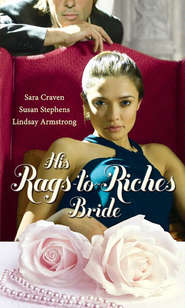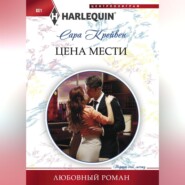По всем вопросам обращайтесь на: info@litportal.ru
(©) 2003-2024.
✖
Fugitive Wife
Автор
Год написания книги
2018
Настройки чтения
Размер шрифта
Высота строк
Поля
Fugitive Wife
Sara Craven
Mills & Boon proudly presents THE SARA CRAVEN COLLECTION. Sara’s powerful and passionate romances have captivated and thrilled readers all over the world for five decades making her an international bestseller.Running away had accomplished nothing!Briony Adair fled to her aunt's Yorkshire cottage as a refuge. Away from the pressures of her father's plans and the unexpected return of her estranged husband, Logan – missing for a year, presumed dead, on a foreign assignment – she hoped to sort out the muddle of her life.But it was more than painful memories she had to face.Logan himself turned up there – different from the man she'd married, as she was changed from the young girl bride. And Logan was determined not to let her escape again!
Fugitive Wife
Sara Craven
www.millsandboon.co.uk (http://www.millsandboon.co.uk)
Former journalist SARA CRAVEN published her first novel ‘Garden of Dreams’ for Mills & Boon in 1975. Apart from her writing (naturally!) her passions include reading, bridge, Italian cities, Greek islands, the French language and countryside, and her rescue Jack Russell/cross Button. She has appeared on several TV quiz shows and in 1997 became UK TV Mastermind champion. She lives near her family in Warwickshire – Shakespeare country.
TABLE OF CONTENTS
COVER (#u3af8cf0c-ff8b-5180-832a-4991b8915490)
TITLE PAGE (#uc20eafc0-ea54-5cdd-8ea5-af7e0da69dac)
ABOUT THE AUTHOR (#uf1525290-62ff-5c59-9b26-dabab9d41cf0)
CHAPTER ONE
CHAPTER TWO
CHAPTER THREE
CHAPTER FOUR
CHAPTER FIVE
CHAPTER SIX
CHAPTER SEVEN
CHAPTER EIGHT
ENDPAGE (#litres_trial_promo)
COPYRIGHT (#litres_trial_promo)
CHAPTER ONE (#ud8f25b06-4952-5c56-bc2f-0c87273644de)
THE track was too steep and stony for the car, so she parked it at the bottom, just off the village road, and walked the rest of the way, the heels of her elegant boots sliding a little on the uneven surface.
She was hurrying, almost running, and deliberately she made herself slow down because the last thing she wanted to risk in this isolated spot was a sprained ankle.
She rounded the slight bend in the track, pausing to catch her breath and shift her suitcase to her other hand, and saw the cottage up ahead of her looking small and rather squat. The full force of the wind caught her, penetrating the thickness of her sheepskin coat as easily as if it was a chiffon veil. ‘A lazy wind,’ Aunt Hes had always called it. ‘Too idle to go round, so it goes straight through you instead.’
It was degrees colder here. It had been quite a pleasant late autumn day when she had left London, with a misty sun shining through the bare branches of the trees, and an invigorating nip in the air. But the further north she had driven, the greyer the skies had become. And here they were slate-dark and threatening over Kirkby Fell, and almost close enough to touch, she thought with a shiver.
It would be good to get inside and get warm. That was, if there was any fuel in the cottage. She wished she had been able to contact Mrs Barnes in the village who kept a friendly eye on the unoccupied house for Aunt Hes. She made sure there was fuel, and usually a stock of provisions for when Aunt Hes wanted to use the cottage. Or to lend it for a holiday retreat or a honeymoon …
But she wouldn’t think about that now. That was what she had come here to escape from. To forget about, if she could. Suddenly there had been this desperate need to evade all the pressures, both subtle and overt, which were being exerted.
And so she’d flung a few things into a case and driven away north without telling a soul where she was going. She’d not even been able to contact Aunt Hes and make sure she had no objections to her using the cottage, because this was the time of year that her aunt always visited friends in the South of France. And who could blame her? she thought as she mounted the last few yards of the track. No one in their right mind faced with a choice between November in the South of France or on the side of a North Yorkshire fell would choose the fell.
She had left a note at the London house stating simply that she was going away to think things out, and would everyone please leave her alone, and not try to find her or contact her. Seen in retrospect, it had been a melodramatic thing to do, an overreaction, she supposed, to the events of the past week. But wasn’t she entitled to that, under the circumstances?
And no one would guess that she had come here—of all places. That was what had kept her going when other destinations had beckoned her from the road signs on the motorway. Destinations with no painful associations, where there would be people to talk to and things to see. Not an isolated cottage at the top of a cart track with only sheep for company.
She pushed open the small white gate in the low grey stone wall, and went in. The flower borders on each side of the narrow path were lank and overgrown with weeds which brushed her legs as she moved between them. The gate needed painting, she noticed, and so did the whole of the outside of the cottage. If the weather had been warmer, she might have tackled it; the physical effort of stripping down the woodwork and applying undercoat and gloss might have been just what she needed.
She’d said she’d come away to think, but wasn’t it nearer the truth to say that she’d come to escape from her thoughts?
All that remained now was to find the key to the front door. She mentally crossed her fingers that Mrs Barnes had not removed it for safe-keeping, or Aunt Hes found a new and safer hidey-hole for it. But it was still there, where it had always been left, under the piece of broken paving stone to the right of the front door.
The door yielded under her hand with a slight protesting squeak, and she went in, closing it behind her and leaning against it while her breathing steadied, feeling oddly like a small animal which had reached its refuge just ahead of the hunters.
She closed her eyes and let the silence surround her, and gradually the small sounds of the cottage and its environs began to impinge on her consciousness—the rustling and stirrings of the ancient fabric of the building itself, the whine of the rising wind in the eaves, the harsh calling of rooks from the fields behind, the distant bleat of a sheep, and nearer at hand the slow reassuring beat of the bracket clock which occupied pride of place on the overmantel of the room Aunt Hes always insisted on calling the parlour. The air smelt faintly musty, but it was only the inevitable odour of a house which had been shut up and untenanted. There was no tell-tale smell of damp or dry rot. Mrs Barnes did her job well, she thought. The place was regularly aired and warmed.
Briony opened her eyes and glanced round. There was a small flurry of envelopes just inside the door and she bent and picked them up. Mostly circulars by the look of things, she thought, tossing them negligently on to the hallstand. She left her case at the foot of the narrow stairs and walked into the living room.
Mrs Barnes did her job not just well, but superlatively, she thought appreciatively as her eyes fell on the fire laid ready in the grate, with the filled coal bucket, and the wicker basket full of sweet-smelling logs all to hand. It was almost as if she was expected. But that was silly. The impulse which had driven her here had not permitted any advance warning. No one knew where she was. No one at all.
No one, she repeated soundlessly, and her hands met in front of her, gripping each other with an odd painful intensity so that her rings bit into her flesh. She looked down wincing, and saw the flat gleam of the plain gold band on her left hand. She dragged it over her knuckle and threw it across the room with all her might. She heard the tinkle as it landed and rolled on the flagged floor. But she did not see where it went, and she did not want to see.
‘I’m Briony Trevor,’ she told herself fiercely. ‘Briony Adair never existed. Never. And nothing that’s happened makes the slightest difference to that.’
A tiny lean-to scullery opened off the living room, and she went through to make sure there was water, and that the electricity supply was switched on. Even if it wasn’t, she could manage for one night, she thought. She knew where Aunt Hes kept the candles, and a small camping stove. But everything seemed to be in working order, and she filled the kettle, and set it to boil while she looked about her. There was a jar of instant coffee, which she sniffed dubiously, and some rather dusty-looking tea-bags in a brightly coloured caddy. Beggars could not be choosers, she thought, opting for probably nasty coffee, drunk black. Tomorrow she would go to the shop in the village and see about milk, and other provisions. But she would make do for tonight.
When she’d made her drink, she would light the fire, and see about airing some bedding.
The fire had been laid in the old-fashioned way, with spills of tightly rolled newspaper and kindling. It caught as soon as she put a match to it, and she knelt placing lumps of coal on the blazing edifice and watching the greedy tongues of flame licking round them.
She fetched her mug of coffee and sat on the high-backed wooden rocker close by the hearth to drink it.
She felt tired suddenly and drained as if this last small effort had finally exhausted her resources. She knew she ought to go upstairs to lie down, but it all seemed too much trouble. Presently she would find the bedding she needed. Presently. But for the moment it was enough to sit quietly with her hands clamped round the comforting warmth of the mug and feel the first tentative heat from the fire reaching out to her. She needed very badly to feel warm. There was a chill deep inside her.
But was this really the right place to come to dispel it? The coffee tasted suddenly bitter in her mouth and she set the mug down with a faint grimace. It had seemed a good idea. The ideal place to exorcise all her demons, to lay her ghosts to rest, she had thought. The only place, in fact. But now as darkness came crowding outside the small windows and the shadows gathered about her, she was not so sure any more.
She should get up and draw the curtains, and light the lamps—one on the square table by the window and the other in the book-lined recess beside the fireplace. But there was no hurry for that.
She was no longer a child to be frightened of the dark, she thought wryly. Her fears and hang-ups were all tangible now, and all to do with reality. Shadows could not hurt her, but people could, and had, and still might.
Sighing, she stretched her legs out in front of her. Slim-fitting trousers in grey cord covered her to her ankles, and a cream-coloured lambswool sweater with a high roll collar reached almost to her pointed chin. A broad-faced watch, its bracelet made of fine gold mesh, encircled her wrist. On her right hand a moonstone ring gleamed. Her left hand looked strangely bare without her wedding ring. Logan’s ring.
She touched the mark on her marriage finger which showed where it had rested, her lips twisting slightly. Throwing it away had been a gesture, that was all. It had altered nothing. Legally, she was still Logan’s wife, even though for months she had believed she was Logan’s widow.
She lifted her hands and removed the two tortoiseshell combs which confined her shoulder-length copper hair behind her ears, shaking it loose around her face. She pressed her fingertips against her temples in an effort to relieve the slight tense ache which was beginning to build up there.
Sara Craven
Mills & Boon proudly presents THE SARA CRAVEN COLLECTION. Sara’s powerful and passionate romances have captivated and thrilled readers all over the world for five decades making her an international bestseller.Running away had accomplished nothing!Briony Adair fled to her aunt's Yorkshire cottage as a refuge. Away from the pressures of her father's plans and the unexpected return of her estranged husband, Logan – missing for a year, presumed dead, on a foreign assignment – she hoped to sort out the muddle of her life.But it was more than painful memories she had to face.Logan himself turned up there – different from the man she'd married, as she was changed from the young girl bride. And Logan was determined not to let her escape again!
Fugitive Wife
Sara Craven
www.millsandboon.co.uk (http://www.millsandboon.co.uk)
Former journalist SARA CRAVEN published her first novel ‘Garden of Dreams’ for Mills & Boon in 1975. Apart from her writing (naturally!) her passions include reading, bridge, Italian cities, Greek islands, the French language and countryside, and her rescue Jack Russell/cross Button. She has appeared on several TV quiz shows and in 1997 became UK TV Mastermind champion. She lives near her family in Warwickshire – Shakespeare country.
TABLE OF CONTENTS
COVER (#u3af8cf0c-ff8b-5180-832a-4991b8915490)
TITLE PAGE (#uc20eafc0-ea54-5cdd-8ea5-af7e0da69dac)
ABOUT THE AUTHOR (#uf1525290-62ff-5c59-9b26-dabab9d41cf0)
CHAPTER ONE
CHAPTER TWO
CHAPTER THREE
CHAPTER FOUR
CHAPTER FIVE
CHAPTER SIX
CHAPTER SEVEN
CHAPTER EIGHT
ENDPAGE (#litres_trial_promo)
COPYRIGHT (#litres_trial_promo)
CHAPTER ONE (#ud8f25b06-4952-5c56-bc2f-0c87273644de)
THE track was too steep and stony for the car, so she parked it at the bottom, just off the village road, and walked the rest of the way, the heels of her elegant boots sliding a little on the uneven surface.
She was hurrying, almost running, and deliberately she made herself slow down because the last thing she wanted to risk in this isolated spot was a sprained ankle.
She rounded the slight bend in the track, pausing to catch her breath and shift her suitcase to her other hand, and saw the cottage up ahead of her looking small and rather squat. The full force of the wind caught her, penetrating the thickness of her sheepskin coat as easily as if it was a chiffon veil. ‘A lazy wind,’ Aunt Hes had always called it. ‘Too idle to go round, so it goes straight through you instead.’
It was degrees colder here. It had been quite a pleasant late autumn day when she had left London, with a misty sun shining through the bare branches of the trees, and an invigorating nip in the air. But the further north she had driven, the greyer the skies had become. And here they were slate-dark and threatening over Kirkby Fell, and almost close enough to touch, she thought with a shiver.
It would be good to get inside and get warm. That was, if there was any fuel in the cottage. She wished she had been able to contact Mrs Barnes in the village who kept a friendly eye on the unoccupied house for Aunt Hes. She made sure there was fuel, and usually a stock of provisions for when Aunt Hes wanted to use the cottage. Or to lend it for a holiday retreat or a honeymoon …
But she wouldn’t think about that now. That was what she had come here to escape from. To forget about, if she could. Suddenly there had been this desperate need to evade all the pressures, both subtle and overt, which were being exerted.
And so she’d flung a few things into a case and driven away north without telling a soul where she was going. She’d not even been able to contact Aunt Hes and make sure she had no objections to her using the cottage, because this was the time of year that her aunt always visited friends in the South of France. And who could blame her? she thought as she mounted the last few yards of the track. No one in their right mind faced with a choice between November in the South of France or on the side of a North Yorkshire fell would choose the fell.
She had left a note at the London house stating simply that she was going away to think things out, and would everyone please leave her alone, and not try to find her or contact her. Seen in retrospect, it had been a melodramatic thing to do, an overreaction, she supposed, to the events of the past week. But wasn’t she entitled to that, under the circumstances?
And no one would guess that she had come here—of all places. That was what had kept her going when other destinations had beckoned her from the road signs on the motorway. Destinations with no painful associations, where there would be people to talk to and things to see. Not an isolated cottage at the top of a cart track with only sheep for company.
She pushed open the small white gate in the low grey stone wall, and went in. The flower borders on each side of the narrow path were lank and overgrown with weeds which brushed her legs as she moved between them. The gate needed painting, she noticed, and so did the whole of the outside of the cottage. If the weather had been warmer, she might have tackled it; the physical effort of stripping down the woodwork and applying undercoat and gloss might have been just what she needed.
She’d said she’d come away to think, but wasn’t it nearer the truth to say that she’d come to escape from her thoughts?
All that remained now was to find the key to the front door. She mentally crossed her fingers that Mrs Barnes had not removed it for safe-keeping, or Aunt Hes found a new and safer hidey-hole for it. But it was still there, where it had always been left, under the piece of broken paving stone to the right of the front door.
The door yielded under her hand with a slight protesting squeak, and she went in, closing it behind her and leaning against it while her breathing steadied, feeling oddly like a small animal which had reached its refuge just ahead of the hunters.
She closed her eyes and let the silence surround her, and gradually the small sounds of the cottage and its environs began to impinge on her consciousness—the rustling and stirrings of the ancient fabric of the building itself, the whine of the rising wind in the eaves, the harsh calling of rooks from the fields behind, the distant bleat of a sheep, and nearer at hand the slow reassuring beat of the bracket clock which occupied pride of place on the overmantel of the room Aunt Hes always insisted on calling the parlour. The air smelt faintly musty, but it was only the inevitable odour of a house which had been shut up and untenanted. There was no tell-tale smell of damp or dry rot. Mrs Barnes did her job well, she thought. The place was regularly aired and warmed.
Briony opened her eyes and glanced round. There was a small flurry of envelopes just inside the door and she bent and picked them up. Mostly circulars by the look of things, she thought, tossing them negligently on to the hallstand. She left her case at the foot of the narrow stairs and walked into the living room.
Mrs Barnes did her job not just well, but superlatively, she thought appreciatively as her eyes fell on the fire laid ready in the grate, with the filled coal bucket, and the wicker basket full of sweet-smelling logs all to hand. It was almost as if she was expected. But that was silly. The impulse which had driven her here had not permitted any advance warning. No one knew where she was. No one at all.
No one, she repeated soundlessly, and her hands met in front of her, gripping each other with an odd painful intensity so that her rings bit into her flesh. She looked down wincing, and saw the flat gleam of the plain gold band on her left hand. She dragged it over her knuckle and threw it across the room with all her might. She heard the tinkle as it landed and rolled on the flagged floor. But she did not see where it went, and she did not want to see.
‘I’m Briony Trevor,’ she told herself fiercely. ‘Briony Adair never existed. Never. And nothing that’s happened makes the slightest difference to that.’
A tiny lean-to scullery opened off the living room, and she went through to make sure there was water, and that the electricity supply was switched on. Even if it wasn’t, she could manage for one night, she thought. She knew where Aunt Hes kept the candles, and a small camping stove. But everything seemed to be in working order, and she filled the kettle, and set it to boil while she looked about her. There was a jar of instant coffee, which she sniffed dubiously, and some rather dusty-looking tea-bags in a brightly coloured caddy. Beggars could not be choosers, she thought, opting for probably nasty coffee, drunk black. Tomorrow she would go to the shop in the village and see about milk, and other provisions. But she would make do for tonight.
When she’d made her drink, she would light the fire, and see about airing some bedding.
The fire had been laid in the old-fashioned way, with spills of tightly rolled newspaper and kindling. It caught as soon as she put a match to it, and she knelt placing lumps of coal on the blazing edifice and watching the greedy tongues of flame licking round them.
She fetched her mug of coffee and sat on the high-backed wooden rocker close by the hearth to drink it.
She felt tired suddenly and drained as if this last small effort had finally exhausted her resources. She knew she ought to go upstairs to lie down, but it all seemed too much trouble. Presently she would find the bedding she needed. Presently. But for the moment it was enough to sit quietly with her hands clamped round the comforting warmth of the mug and feel the first tentative heat from the fire reaching out to her. She needed very badly to feel warm. There was a chill deep inside her.
But was this really the right place to come to dispel it? The coffee tasted suddenly bitter in her mouth and she set the mug down with a faint grimace. It had seemed a good idea. The ideal place to exorcise all her demons, to lay her ghosts to rest, she had thought. The only place, in fact. But now as darkness came crowding outside the small windows and the shadows gathered about her, she was not so sure any more.
She should get up and draw the curtains, and light the lamps—one on the square table by the window and the other in the book-lined recess beside the fireplace. But there was no hurry for that.
She was no longer a child to be frightened of the dark, she thought wryly. Her fears and hang-ups were all tangible now, and all to do with reality. Shadows could not hurt her, but people could, and had, and still might.
Sighing, she stretched her legs out in front of her. Slim-fitting trousers in grey cord covered her to her ankles, and a cream-coloured lambswool sweater with a high roll collar reached almost to her pointed chin. A broad-faced watch, its bracelet made of fine gold mesh, encircled her wrist. On her right hand a moonstone ring gleamed. Her left hand looked strangely bare without her wedding ring. Logan’s ring.
She touched the mark on her marriage finger which showed where it had rested, her lips twisting slightly. Throwing it away had been a gesture, that was all. It had altered nothing. Legally, she was still Logan’s wife, even though for months she had believed she was Logan’s widow.
She lifted her hands and removed the two tortoiseshell combs which confined her shoulder-length copper hair behind her ears, shaking it loose around her face. She pressed her fingertips against her temples in an effort to relieve the slight tense ache which was beginning to build up there.













